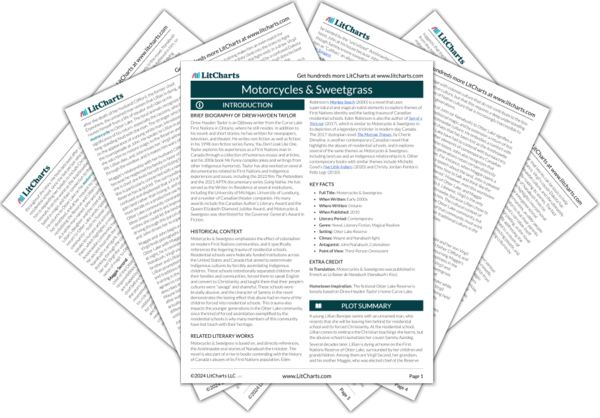A central concern of the Anishnawbe community of Otter Lake is the new parcel of land that Maggie, the chief, has purchased for the Reserve. Maggie is constantly fielding suggestions from her constituents about what to do with the land. Most of their suggestions are impractical, but she is reluctant to consider even the more feasible recommendations because she believes the land should be left wild. Maggie holds a traditionally Indigenous perspective of land: she retains the cultural belief that the land and the people who live on it are all part of Mother Earth, and that land does not need to be productive to have value. However, her position as chief requires her to accommodate white Canadians, who have never seen land in this way, and First Nations citizens who have lost this reverence for the land. Maggie recognizes this perspective in her community as the result of internalized colonialism colliding with their love of the land, and she resents that “a love of land, which had once united Aboriginal people, was now tearing them apart.” She also feels immense pressure to appropriately manage the parcel of land, since she recognizes that white people are uncomfortable with Indigenous communities gaining land rather than losing it.
At the end of the novel, John circumvents the administrative and political pressure on Maggie by burying ancient bones on the land, rendering the land unusable (once bones are found, the land is automatically protected). Maggie is furious, but since John is a being almost as old as the land itself, he bears little respect for the policies that people put in place to manage it. The land ultimately remains wild, highlighting that the land doesn’t need to prove its worth through development; it is already valuable as a site of memory, as well as of spiritual and cultural significance.
Colonialism and Land Use ThemeTracker

Colonialism and Land Use Quotes in Motorcycles & Sweetgrass
Even though the rider’s eyes were hidden, the crow could feel its piercing gaze. The rider lifted its helmet a few inches until only its mouth was visible. And from that mouth came a loud caw. Not a human imitating a crow, but what seemed to the crow an authentic crow caw. The crow had been around for a few years and knew the difference. Crows do communicate, in their own way, and “I'm back” is what the crow heard.

Unlock explanations and citation info for this and every other Motorcycles & Sweetgrass quote.
Plus so much more...
Get LitCharts A+To her, as chief, White politicians, while having the potential to be devious, self-serving and a general pain in the ass, were less stressful than the over twelve hundred people she represented, most of whom she was related to, all tugging at her pant legs with suggestions about what to do with the new land. Three hundred acres was an almost twenty-percent increase in the size of the community. Every member of the band had an opinion on the purpose and destiny of that land. And they all had a very strong need to share their opinions with her, whether she wanted to hear them or not. […] A love of the land, which had once united Aboriginal people, was now tearing them apart.
Of course it wasn’t solely Maggie’s decision; there was the Band Council to go through, as well as a bunch of committees and boards to deal with. White people may have invented bureaucracy, but their relationship with the Department of Indian Affairs had taught the First Nations people of Canada how to excel at and, in their own way, indigenize it. All land utilization ideas and economic development schemes started their journey on Maggie’s desk. And she was getting tired of it.
Land...no issue affected Native peoples and non-Native peoples so strongly and yet so differently. On the one hand, White people thought land was there to be owned and utilized. […] Otherwise it was wasted. […] Native people, on the other hand, saw themselves as being part of Nature. It was a big huge intertwining web. You could no more own the land under your feet than you could the sky over your head […].
But colonization had a nasty tendency to work its way into the DNA, the beliefs and philosophies and the very ways of life of the people being colonized. Nowadays, some of the people on Maggie’s Reserve, other than having a good tan, were indistinguishable from White people.
Lillian, however, had been what could be called an old-fashioned Indian, and she had taught her family respect for this land.
It has been said that the land does not forget; it is in fact the memory of all who live on it. In today’s world, raccoons live closer to the earth than most people, so their memory too is longer.
“You and your community had better have some good ideas about what to do with that land. You can’t just let it be. People in the municipality won’t stand for it after all these headaches.”
“But they were letting it just lie there until now. It was an abandoned cottage and a practically unused woodlot. Why do we have to do something different?”
The MP smiled at the chief’s naiveté. “Because, my friend, it’s human nature.”
“You know, I never thought I’d see the day when Native people would be paying good money for something as available as water. White people I understand. They like to buy and own everything, but man, Native people too? That’s when you know something is wrong.”











